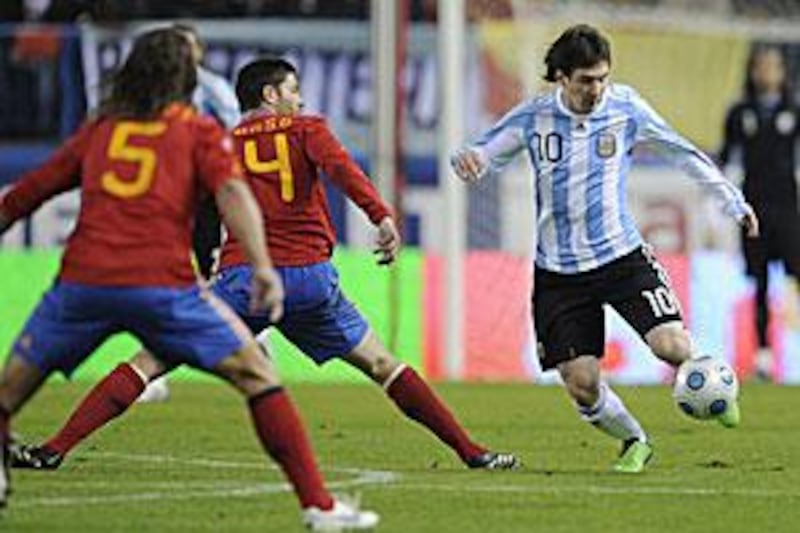In Argentina, the view is that Diego Maradona got off more lightly than anticipated when he walked out of a Fifa tribunal on Sunday with a two month ban from football and a fine of 25,000 Swiss francs (Dh91,000). His offence was last month's foul-mouthed outburst, directed at reporters after Argentina had narrowly secured qualification for the World Cup. His suspension will now have a bearing only on one or two of the lower-key warm-up events the Argentina head coach had planned between now and the middle of January.
But Maradona left Europe at the weekend with other offences levelled against him, mainly from the unsympathetic judges of the Spanish media. His team had on Saturday night lost 2-1 to Spain, the national squad ranked No 1 in the world by Fifa at the moment, in a so-called friendly in Madrid. The performance of the visitors was not so much vintage white-and-sky-blue as heavily black-and-blue. From the first minute, it was an unusually bruising encounter for a non-competitive, mid-season match. Seven yellow cards had by the final whistle been issued by the Irish referee Alan Kelly, who awarded penalties to each team in the second half.
If Spanish speakers found Maradona's language vulgar on the night he delivered Argentina to World Cup 2010, Spanish purists found his football even more so. There are, for some tastes, too many toughies and spoilers in the Argentinian team being shaped by Maradona. He has selected an extraordinarily high number of footballers in his nine games as head coach, but among those to whom he has been most loyal is the Marseille defender Gabriel Heinze, once of Real Madrid and Manchester United.
Heinze is a vigorous tackler and not an elegant runner or passer. His hardness was for a period admired in the Premier League and in Spain's La Liga, but United and Real both let him move on, deeming his best years behind him. Yet to Maradona, Heinze's failings in speed or movement seem to be compensated by his leadership. Heinze is the bristling face of this Argentina team and Spain's players recognised it immediately. The hottest head in the Spain side, Sergio Ramos, was involved in a tetchy challenge with Heinze, his former Real colleague, within 20 seconds.
From there the die was cast. Heinze had a quarrel with David Villa that required the intervention of others to restore the peace. Afterwards the mild Andres Inie-sta, one of the dainty dwarves who make up the Spanish midfield, complained about a tackle by Fabrizio Coloccini - "there were too many ugly challenges," he added - while Maradona, easing into his characteristic rhetoric, thought the referee had been influenced in favour of the home team and the fact that the Spain Football Federation was celebrating its centenary and it suited them to win because of that.
"The referee gave us nothing," remarked the head coach. Maradona has been cultivating this sort of us-against-the-world attitude since he took over the position. Indeed, he has been adopting that posture for much of his life, that of the populist rebel who rails against the West, against George Bush, against Fifa or against anything authoritarian. But with Argentina, the attitude is a necessary acknowledgment that, given their patchy progress in World Cup qualifying, they are not among the favourites for South Africa 2010, and have some alarming shortfalls in personnel.
In the company of his compatriots, Leo Messi, the best player in the world in 2009, looks isolated and dulled. At the Vicente Calderon stadium at the weekend, Messi, wearing the No 10 shirt once graced by Maradona as a player, received the ball a mere three times in the first half hour. He would have been forgiven for longing for the kind of service he gets at Barcelona from the likes of Xavi and Iniesta, who were directing operations for Spain. Argentina have nobody to compare.
Fernando Gago, the one-paced midfielder who struggles to make the first XI at his club, Real Madrid, is hardly transformed in an Argentina jersey, but he still forms a pair in central midfield with Javier Mascherano, the Argentina captain. At full-back, the aggressive Coloccini, normally a centre-half, now gets called up from the second tier of English football, where he plays for Newcastle United. At left-back, resources are scant. Argentina do have lively wingers, in Angel di Maria and Maxi Rodriguez, but when the targets in the penalty area are likely to include the diminutive Messi and Sergio Aguero, their crossing options become limited.
At least Maradona, after a long period of indifference towards Gonzalo Higuain, the Real striker, has now taken him into the fold, which will add some gumption up front. To be outpassed by Spain is no shame. Most teams are. To hear Spain complaining about unsophisticated tactics by the opposition is nothing new, either. It is a national habit. But Maradona's Argentina have much to resolve if they are to be widely feared in South Africa. And their head coach has to be careful about a good deal more than just minding his language over the next eight months.
@Email:ihawkey@thenational.ae






